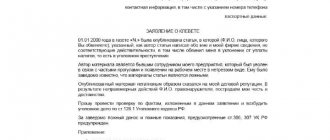MOSCOW, November 29. /TASS/. The Supreme Court of Russia has developed detailed recommendations for protecting the rights of prisoners. Every year, Russian courts consider 4-5 thousand complaints about the conditions of detention of convicted persons, those in custody and administrative detainees, the chairman of the judiciary, Vladimir Khamenkov, said at a meeting of the plenum of the Supreme Court of the Russian Federation.
“About 50% of complaints are satisfied. Every year, the courts determine compensation for damages in the amount of about 70 million rubles,” he said. In addition, this year the ECHR made decisions on the payment of compensation for such complaints in the amount of €2.58 million.
Filing a claim
Both the person deprived of liberty and his representative can file an administrative claim for violation of conditions of detention. In addition, persons deprived of their liberty have the right to bring a class action to court. At the same time, a possible subsequent refusal of an already filed claim may not be accepted by the court if it violates the rights of other persons. “Taking into account the peculiarities of this category <...> of cases, the court in each case must take measures to establish the reasons that prompted <...> to decide to abandon the claim,” the plenum noted. Commissioners for human rights, children's rights and the protection of the rights of entrepreneurs can also apply to the court to protect the rights of those deprived of their liberty.
Right to psychological assistance
The rights and freedoms of convicted persons include the legal opportunity to receive psychological assistance, which can be provided if necessary. It can be provided by employees of the specialized service of the pre-trial detention center, as well as by those persons who, due to their professional abilities and the availability of appropriate education, can provide it. The legislator has determined that every correctional institution must create a psychological service, whose specialists can provide qualified assistance.
As part of special programs, employees of the psychological service of the pre-trial detention center can conduct free seminars, trainings, lectures and, in some cases, psychotherapy sessions for prisoners, which help improve the moral state of prisoners.
The legislator also provides convicts with the opportunity to invite a private psychologist. In this case, his services will be paid exclusively from the prisoner’s personal funds.
Signs of violations
The Plenum noted that violations of conditions of detention are “significant deviations from the requirements” of the law, taking into account the regime of the place of forced detention. “Courts must take into account that the presence of violations <...> may be evidenced by overcrowding of cells, the impossibility of free movement between pieces of furniture, the lack of an individual sleeping place, natural or artificial lighting sufficient for reading, the lack of ventilation and heating.” Violations may also be indicated by failure to provide walks, difficult access to sanitary facilities, lack of sufficient privacy, inability to maintain personal hygiene, violation of requirements for the quality of air, food, drinking water, protection from noise and vibration.
At the same time, courts must take into account measures taken to compensate for inconveniences, for example, a slight deviation from the standard area for one person can be compensated by creating conditions in other premises, in particular for education, sports, leisure, and work.
The prohibited type of treatment of prisoners can be indicated by his repeated movements from one institution to another, as well as the lack of information about medical examinations performed, including in cases where physical coercion was used.
Rights in the medical field
Does a convicted person have the right to receive medical care? Yes, it has. Moreover, such a legal possibility is prescribed by several regulations of an international and domestic nature. Moreover, in Russian pre-trial detention centers and colonies, medical care can be provided even if the person does not have appropriate insurance. It should be noted that this right of convicted persons originates from the Constitution of the state, in Art. 41 which states that the health of any person must be protected to the proper extent.
Within the framework of the provisions presented in this legislation, all those persons held in colonies can be provided with both emergency and primary medical care. Moreover, if necessary, the patient can be placed in an outpatient clinic or in a hospital, if such are provided in the colony. If there is no such department at the institution in which the sentence is being served, the patient can be transferred to the nearest pre-trial detention center that has one.
The current legislation in the Russian Federation categorically prohibits conducting any medical or scientific experiments or research on prisoners. However, if such actions have received the written consent of the convicted person, their implementation is not prohibited.
Use of physical force
The Plenum emphasized that “no circumstances, including orders <...> of officials, the severity of the offenses committed by a person, can be recognized as a justification for the application of prohibited types of treatment to him <...> or as a basis for releasing the perpetrators from liability.”
When assessing the legality of the use of physical force, special means and other measures of mental and physical influence, it should be taken into account that “if such coercion was carried out for legitimate purposes, without exceeding permissible limits and, accordingly, was a proportionate (proportional) measure, then in the case when the use of these measures violated the right to personal integrity, caused pain, and cannot be considered a prohibited type of treatment.” Courts should take into account the regime in places of forced detention, the grounds, consequences and proportionality of the use of such measures, their termination after the threat to law and order has been eliminated, the timeliness of medical examination or treatment. At the same time, medical care must comply with the standards required in the Russian Federation.
Features of the implementation of civil rights by those sentenced to imprisonment
Such punishment for a crime as imprisonment has a serious impact on the totality of civil rights and obligations of convicted persons. This is due, first of all, to the imposition of special regime requirements on criminals. At the same time, the state must establish for persons sentenced to imprisonment such a system of restrictions on rights and impose on them such specific responsibilities that would be within the framework of respect for human and civil rights in accordance with the principles and norms of international law, the Constitution of the Russian Federation, and would also contribute to achieving the goals of punishment. Problems of the civil legal status of persons sentenced to imprisonment require comprehensive study. Especially from the point of view of the effectiveness of the legislation governing it as a means of protecting the rights, freedoms and legitimate interests of these subjects of civil law, as well as the activities of bodies, institutions, organizations and other persons interacting with them, it has important scientific, social, moral and practical significance. Persons sentenced to imprisonment may be participants in various civil legal relations, including property relations, obligatory legal relations arising from contracts, as well as as a result of causing harm. Studying the problem of the implementation of civil legal capacity by convicts during the execution of punishment in places of deprivation of liberty, one can come to the conclusion that it is not implemented in any way. But this is erroneous, since the attitude towards convicts on the part of society, the state and individual citizens testifies to the level of development of a given society, the degree of its humanism and democracy at a specific historical turn of development. In this regard, the general social significance and relevance of studying the problems of the civil legal status of persons sentenced to imprisonment, issues of their participation in civil legal relations, as well as finding opportunities for the real implementation of positive experience in this area in the practice of execution of punishment are increasing. When considering this category of citizens, we set ourselves the goal of studying the relationship between the concepts of civil personality, legal capacity and capacity, to outline their boundaries within the framework of the current civil legislation of the Russian Federation and other legal acts regulating the legal status of those sentenced to imprisonment. Also of particular importance is the legal consolidation of the ability of persons serving a sentence of imprisonment to act as subjects of legal relations, to exercise the rights and obligations provided for by civil legislation and international agreements. Thus, exploring the problems of legal relations, subjective rights and obligations, as well as the problems of their emergence, implementation and protection, legal responsibility in a general theoretical aspect and in relation to individual institutions of law, we are faced with the need to consider the specifics of the subject. It is impossible to study the institutions of civil law without directly or indirectly touching upon the subject of these relations, especially if the role of the subject is played by such a category of citizens as persons sentenced to imprisonment. Ideas about civil legal personality are associated with the presence in persons of such qualities as legal capacity and legal capacity. Property relations regulated by civil law accompany a person throughout his life: from the moment of birth to his death. Of course, it is difficult to imagine a newborn or young child, for example, entering into an agreement, but such a child may already have a certain set of civil rights and obligations (become an owner, inherit property bequeathed to him, etc.). Civil legal personality represents the most complete, summarily expressed possibility of legal ownership, recognized equally for all persons. To characterize the scope of the subjective rights and obligations of the subject, as well as its legal capabilities, it would be more correct to stipulate its legal status. Legal personality is closely related to the characteristics that individualize a specific subject of law. This work examines such a category of citizens as convicts. This is due to the fact that convicts are limited in their legal personality, since they are in prison. The state has the right to restrict the rights and freedoms of citizens by issuing relevant regulations, namely federal laws. However, this can only be done under conditions of a state of emergency (military), indicating the limits and duration of such a restriction (if it is necessary to protect the foundations of the constitutional system, morality, health, rights and legitimate interests of other persons, ensuring the defense of the country and the security of the state) (h 3 Article 55 of the Constitution of the Russian Federation). But even in these cases, such rights and freedoms as the right to life, the right to protect one’s honor and good name, personal dignity, privacy, freedom of conscience and religion, the right to freely use one’s abilities and property for business cannot be limited. activities, the right to housing, the right to judicial protection of rights and freedoms. Based on the foregoing, we draw a conclusion about the relevance of the issue of protecting the civil rights of those sentenced to imprisonment in reality, without taking into account persons who have received a deferment of execution or those sentenced to probation. Their legal personality is limited due to the insufficiently developed mechanism for their civil legal protection due to their presence in places of deprivation of liberty. But along with the limitation of the legal personality of persons sentenced to imprisonment, there is the problem of the convicts’ exercise of rights to private property. The objects of civil rights of convicted persons, like all citizens, can be things, including money and securities, as well as other property, including enterprises, property complexes and other real estate. The right of a convicted person to private property depends on where the property is located: in a correctional institution or outside it. The right of private ownership of a convicted person to property located outside the place of deprivation of liberty is retained by him. Imprisonment as a form of punishment does not terminate the right of private ownership of property acquired by the convicted person before imprisonment (except for cases of confiscation of this property by a court verdict and if it was not levied for compensation for damage caused by the crime). Such property can be a car, a house, or other things that belong to the convicted person as private property, as well as as participants in the right of common shared or joint ownership. The convicted person may become the owner of newly acquired property through a representative or by inheritance. He retains the right of ownership of the property that belongs to him and is located outside the colony, but the procedure for exercising this right is modified: the convicted person is only temporarily unable to exercise the right of ownership (the possibility of economic domination of the owner over the property) and the right of use (the possibility of extracting its useful properties from the property). And he exercises the power of disposal (meaning the execution of acts in relation to a thing that determine its fate) in full, i.e. he can, for example, sell, donate a thing, rent it out, but with the help of a representative (spouse, parent, other relative, other person) to whom a power of attorney is issued. By virtue of the power based on a power of attorney, the representative of the convicted person can directly create, change and terminate his civil obligations and rights (for example, pledge property, encumber it in other ways, dispose of it at the discretion of the principal: sell, donate, etc.) . Powers of attorney of persons in prison, certified by the head of the relevant institution (Articles 182, 183, clause 3, part 3, Article 185, etc. of the Civil Code of the Russian Federation) are equivalent to notarized powers of attorney. Most often, the motive for making transactions in which the convicted person acts as a seller is concern for the safety of the property remaining in his freedom, especially in cases where he does not have close relatives and friends who can provide the necessary supervision. When selling property, money, at the direction of the convicted person, can be transferred to his personal account in the penal colony. The convicted person has the right, through his representative, to carry out administrative acts, for example, purchase and sale transactions, rental of property, etc., outside the correctional institution. In this regard, the question arises of how the interests of the convicted person himself should be ensured in relation to his property located outside of prison, and other persons whose claims are related to this property - the interests of creditors, the interests of the state in taxation and etc. When a person sentenced to imprisonment has relatives or other people close to him who take care of his property, the issue is practically resolved quite simply. The situation is more complicated with single convicts. In addition, sometimes even if there are relatives, conflicts may arise between them and the prisoners. For example, before imprisonment, convicted K. lived with citizen R. as a subtenant. The things belonging to K. remained with the owner without any registration. Subsequently, K. turned to R. with a letter in which she asked to send her some things to the colony. R. not only did not fulfill this request, but generally refused to return K. any things. Then K. filed a claim against R. for the recovery of property, which was satisfied by the court. After this, the administration of the colony ensured that the specified property, according to the inventory, was transferred for storage to a person chosen by the convict herself. It is clear that there would be no need to carry out this entire complex procedure if the general rule was in force that the property of a convicted person at the time of deprivation of liberty should be transferred at his request for storage either to persons named by him or to persons specially appointed for these purposes, as is done in relation to inherited property or the property of a missing person. In general, the principle of inviolability of private property applies to convicted persons. Deprivation of liberty does not in itself terminate the right to property. For the crime committed, the perpetrator bears criminal punishment, but he cannot be deprived of the necessary property on this basis. The convicted person as a citizen is not deprived of legal capacity and capacity in the field of property rental relations as a lessor. If before his conviction he acted as a renter, then even while serving his sentence he will be a party to these contractual relations, and the tenant is obliged to fulfill the terms of the contract. He has the right to lease property belonging to him that is stored outside the PS. In some cases, a convicted person can also act as an employer: for example, having a car for personal use, he rented a garage space from another person before his arrest and continues to fulfill the terms of the agreement even after being sentenced to imprisonment. Also, in a correctional institution, the right of ownership of convicts to property that is prohibited for use in the correctional facility and deposited by them for storage (money, securities, equipment, other valuables) is allocated. The storage of securities acquired by a convicted person in accordance with the established procedure is ensured by the administration of the correctional institution (Part 10, Article 82 of the Penal Code of the Russian Federation). Money, securities and other valuables found on the territory of a correctional institution, the owner of which has not been identified, are turned into state income in accordance with the legislation of the Russian Federation (Part 9 of Article 82 of the Penal Code of the Russian Federation). In a correctional institution, in addition to the right of ownership of convicts to property prohibited for use in the correctional institution and deposited by them, there is a right of ownership to essential items permitted for use, and items of clothing allowance after payment of their cost, as well as to food products received in parcels and transfers and purchased by bank transfer within the limits specified by law. In addition to personal hygiene items and clothing, convicts may have in their personal use books, magazines and newspapers received by them by subscription, purchased by bank transfer at retail outlets of a correctional institution or transferred in parcels, parcels, packages, food, and other items. In relation to these items, convicts exercise powers of possession and use. It is prohibited to dispose of them (sell, give, exchange, alienate in other ways to other convicts) inside the penal colony. Thus, the rights to own and use property of convicts who are in a correctional institution are fully retained only in relation to things left to the convict upon admission to the correctional institution or legally acquired by him while serving his sentence. A convicted person can dispose of property that belongs to him, for example, sell it, give it to relatives or other persons, but only outside the correctional facility. I would like to note that the civil legal status of persons sentenced to imprisonment is derived from the general civil legal status of citizens of the Russian Federation, based on generally recognized human rights, enshrined in the norms of international law and the Constitution of the Russian Federation. Their legal personality is limited due to the fact that they are in prison and cannot independently exercise some of their civil rights. In general, we can conclude that the civil legal personality of persons sentenced to imprisonment is exercised through the institution of representation if the issue concerns property located outside the correctional institution, pre-trial detention center, prisons, with the exception of cases where the personal participation of the convicted person is necessary, for example, notarial transactions , but within the limits of his competence, the head of the PS can replace the notary as part of the certification of the will. List of used literature. 1. The Constitution of the Russian Federation, adopted by popular vote on December 12, 1993 (as amended on December 30, 2008) // SPS Consultant Plus. 2. Civil Code of the Russian Federation (part one) dated November 30, 1994 No. 51-FZ (as amended on June 27, 2012) // SPS Consultant Plus. 3. Concept for the development of civil legislation of the Russian Federation (approved by the decision of the Council under the President of the Russian Federation for the codification and improvement of civil legislation dated October 7, 2009) // SPS Consultant Plus. 4. Regulations on the use of the “social elevator” system in correctional institutions of the Federal Penitentiary Service of Russia under the current legislation // SPS Consultant Plus. 5. Gomola A.I. Civil law. – M., 2007. 6. Civil law / ed. Alekseeva S.S., – 2nd ed. – M.: Prospekt, 2009. 7. Grishaev S.P. Civil law. – M.: Yurist, 2002. 8. Egorov N.D. Civil law, vol.2. – M, 2005. 9. Smolensky M.B. Civil law. – M., 2007. Simonova Daria Vladimirovna , Perm Institute of the Federal Penitentiary Service of Russia, 4th year cadet Source: Perm Institute of the Federal Penitentiary Service of Russia Related materials
Track. article
Prev. article
Plaintiff's defense
If there is a real threat to the life or health of a person deprived of liberty, the court must take all measures within its power to consider the administrative case as soon as possible, and, if necessary, apply preliminary protective measures (transfer to another premises, medical examination).
Those deprived of their liberty must be guaranteed the right to be heard by a court, for example through video conferencing. The court also has the right to order the location of the prisoner to obtain his explanations on the circumstances of the case. Imprisoned witnesses can also be questioned via video conference.
A person deprived of his liberty may be exempt from paying state fees when filing a claim if he is not employed and does not have sufficient funds in his personal account. If the administrative claim is satisfied, the fee, like all court costs, is recovered from the defendant.
Basic principles
It should be noted that all legal options for prisoners are based solely on the principles established by international legislation and treaties. Each of them has a foundation - recognition of human dignity. This presupposes that a person cannot be deprived of his fundamental rights even if he has committed a crime. Also among the fundamental principles are equality, humanity and democracy.
So, in the following sections, we will consider all the main features of the rights of convicts that this group of people has in Russia.
Consideration of the claim
Considering the objective difficulties for the plaintiff in collecting evidence about violations of the conditions of detention of those deprived of liberty, the court must assist him, including by requesting evidence on his own initiative (for example, materials of public monitoring commissions (POC). Members of the PMC can also be questioned as witnesses in consideration of the complaint.
The court may also order an examination of the conditions of detention, as well as oblige the defendant to provide a video recording of the premises of the places of detention.
The right to use one's native language
Those sentenced to imprisonment have the right to use their native language, in which they can give any explanations in the courtroom or to employees of institutions where prisoners are kept, write complaints, appeals, and also conduct correspondence. If necessary, to clarify the meaning of everything said and written, the prisoner can use the free services of an interpreter. All responses to inquiries, complaints and statements must be provided in the language in which the original document was written. The body executing the punishment may translate the document into the state language.
Up to the bailiffs
When considering a case of violation of conditions of detention, the court must determine a reasonable and sufficient period for eliminating the violations, and in exceptional cases (if there is a threat to the life and health of those deprived of liberty) oblige them to eliminate them promptly.
When a claim for conditions in places of forced detention is satisfied (colony, pre-trial detention center, temporary detention center, detention centers for juvenile offenders or expelled foreigners - TASS note), the defendant is obliged to inform the court and the plaintiff within a month about the execution of the court decision to eliminate violations. If this does not happen, as well as in cases where the court decision must be executed within a shorter period of time, the judge sends a writ of execution to the bailiffs. If signs of a crime are identified, the court must send a copy of the minutes of the meeting to the investigators. He may also find it necessary to publish the decision in the administrative case.
Social Security
Are convicts entitled to social security? Yes, they do. The legislator notes that the group of persons in question may be given the opportunity to receive benefits in the event of insured events, as well as pensions and various other payments provided for by the legislation on social insurance. However, it should be noted that such opportunities can only be used by those convicts who work within the colony where they are serving their sentence.
Personal safety
In accordance with current legislation, the fundamental rights of convicted persons include respect for the personal safety of those in custody.
In order for this right to be ensured to the proper extent, the system of institutions entrusted with the responsibility for carrying out the execution of sentences works exclusively according to developed plans, precisely implementing all those measures that are required to ensure the safety of prisoners. These, first of all, include round-the-clock surveillance, operational supervision and video surveillance of everything that happens in the detention cells.
To properly ensure this right of a convicted person, if certain threats to the life, health and safety of the prisoner are identified, colony staff must act in strict accordance with established rules. First of all, if danger is detected (in practice, this often happens by providing a written or oral statement), the administration of the pre-trial detention center is obliged to transfer the prisoner to a safe place, which, as a rule, is a separate cell.
Practice shows that the period of stay of a person in such a place is no more than three months. During the allotted time, representatives of the administration must apply certain measures of influence or punishment on those prisoners who posed a threat to the personal safety of the convicted person.
In the event that a threat situation occurs instantly and does not tolerate any delay, decisions instead of the head of the pre-trial detention center can be made by the duty officer who is currently on duty. After the head of the colony arrives at the scene, these powers are transferred to him.
Education
One of the rights of convicts concerns education, even while in prison. The regulations state that, despite deprivation of liberty, prisoners have the right to receive general and vocational education, as well as vocational training.
Such a right can be realized with the help of specialized educational institutions that are created in many colonies in the Russian Federation. The legislator considers the fact of receiving education one of the main ways to correct a citizen who has broken the law. Also, the regulations establish that all persons who have not reached the age of 30 while serving a sentence are required to receive at least secondary education.





